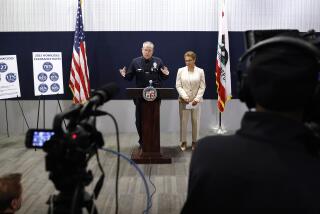Flurry of Lawsuits by Victims Marks 1st Anniversary of Riots : Courts: Dozens, including trucker Reginald O. Denny, file legal actions over beatings, deaths and devastation. Some doubt the legal merit because of state immunity laws.
The filing of more than a dozen lawsuits has marked the one-year anniversary of the Los Angeles riots, as victims who were beaten by rioters, saw their businesses burn down or mourned the death of a loved one seek compensation through the courts.
Trucker Reginald O. Denny, whose beating at Florence and Normandie avenues April 29, 1992, became the most enduring symbol of the violence, filed lawsuits in Los Angeles Superior Court and U.S. District Court. He charged that Los Angeles police and city officials deprived him of his civil rights because of the way police resources were allocated that night. He seeks $40 million in each suit.
Two other motorists at the same corner, Fidel Lopez and Takao Hirata, filed similar suits, as did Wanda Harris, the mother of Gregory Davis Jr., a 15-year-old who was one of the first killed in South-Central Los Angeles as the unrest began.
In other suits filed this week, a photographer sued Associated Press for sending him into the heart of the rioting, where he was assaulted and robbed of his camera equipment. Free-lancer Heywood Galbreath’s suit seeks unspecified damages for negligence, negligent infliction of emotional distress and interference with his ability to earn a living. An official at the news agency had no comment.
More than 100 small-business owners whose insurance companies failed to pay them millions in claims brought a suit in Los Angeles Superior Court, seeking insurance proceeds and better regulation of the insurance industry. Most of them were unable to rebuild.
Five other owners of businesses, including grocery, liquor and office furniture stores, filed lawsuits against their insurers, charging that they had been partly or totally unpaid.
Dr. Gerald Fradkoff sued the city of Los Angeles and the Police Department for the fire that burned his office on the second day of the riots, claiming “the fire was caused by inadequate police protection.”
The legal question is: Will any of the lawsuits prevail?
Among the handful of lawsuits filed by those alleging negligence on the part of police or government officials during the riots, two have been dismissed in Los Angeles County courts. One federal court suit was withdrawn by the attorney who filed it because he concluded that it would not be winnable.
State law provides immunity for failure to provide police protection--an argument successfully used against claimants after the Watts riots. Because of that provision, Stewart Kwoh of the Asian Pacific American Legal Center, said a class-action suit, contemplated by about 2,000 Asian-American victims, would not be brought.
But attorneys for Denny, Lopez, Hirata, & Harris sought to get around the immunity hurdle by alleging that the victims’ constitutional rights had been violated. According to complaints filed by attorney Johnnie L. Cochran Jr., they were the victims of selective police enforcement that deliberately left minority neighborhoods exposed.
“State immunity cannot impinge on federal constitutional rights--the right granted to all citizens under the 14th Amendment to equal protection under the laws,” said Eric Ferrer, an attorney in Cochran’s office.
The Denny suit alleges that police and City Council members deliberately redirected resources from areas “composed predominantly of black and Hispanic populations to areas in the city composed predominantly of Anglo populations.”
Senior Assistant City Atty. Thomas Hokinson called that allegation absurd, and challenged Denny and the others to prove it. “They have to produce evidence there’s some type of policy, practice or custom to discrimination by where we deploy our officers,” he said.
Hokinson said these lawsuits would be no more successful than earlier ones. “I don’t think there’s any liability,” he said. “This is an attempt to get around the case law that came out after the Watts riots. There are limitations as to what we can do in terms of the officers we have and the finances we have.”
Los Angeles police spokesman Lt. John Dunkin said department policy prevented comment on any matter in litigation.
Legal experts say a key U.S. Supreme Court ruling in 1989, known as the DeShaney decision, could have bearing on the cases. That case involved a small boy who was killed by an abusive father, and whether officials who were aware of the home environment should have intervened.
The decision, written by Chief Justice William H. Rehnquist, said the government had no constitutional duty to provide such protection.
The decision also said “the state may not, of course, selectively deny its protective services to certain disfavored minorities.”
Ferrer said the complaints from Denny and the others are keyed to that passage. “That is a viable legal theory; it’s just, are there facts to prove it?” said USC law professor Erwin Chemerinsky, an expert on constitutional law.
Some cases, such as those seeking damages or alleging civil rights violations, were filed to meet legal or contractual deadlines requiring filings within a year of the injury. But more lawsuits could result from the 2,900 administrative claims filed against the city, or 2,200 against Los Angeles County last fall. Such claims must be filed before a public entity can be sued. Once denials are issued, plaintiffs have six months to sue.
Kwoh said his center was preparing a class-action suit for riot victims against the Federal Emergency Management Agency for its failure to accept the claims of thousands seeking emergency aid after the riots. “FEMA was almost a disaster in itself,” Kwoh said.
More to Read
Sign up for Essential California
The most important California stories and recommendations in your inbox every morning.
You may occasionally receive promotional content from the Los Angeles Times.










